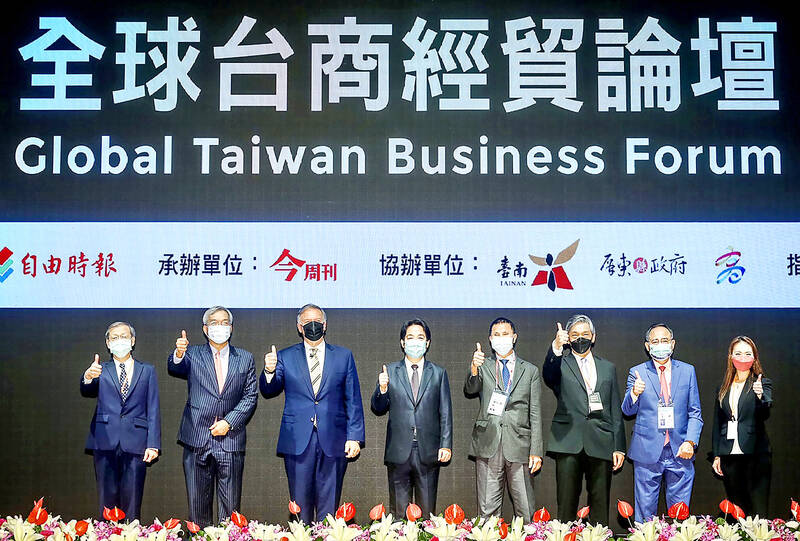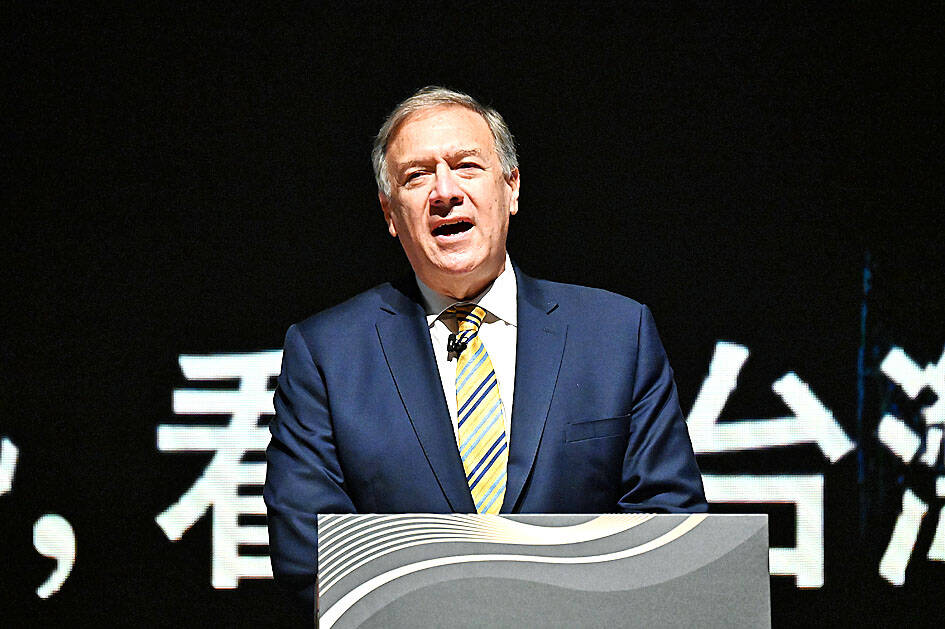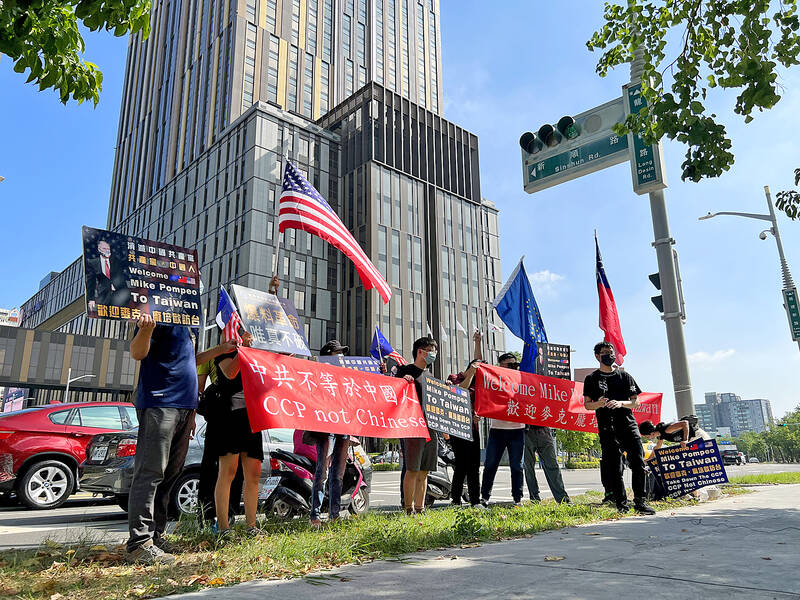The economic “status quo,” which benefits China, is changing, presenting opportunities for closer cooperation between Taiwan and the US, former US secretary of state Mike Pompeo told a business forum in Kaohsiung yesterday.
Pompeo is visiting Taiwan for the second time this year to attend the Global Taiwan Business Forum, organized by the Liberty Times (sister paper of the Taipei Times).
In a speech before more than 300 business representatives at the Kaohsiung Marriott Hotel, Pompeo discussed shifting relations in Southeast Asia driven by aggressive Chinese conduct.

Photo: CNA
Beijing’s actions have changed the region and “brought those who prefer peace and commerce even more closely together,” he said.
Pompeo said that as secretary of state he and his department grappled with some fundamental questions about long-standing US policy toward China.
“America must admit a hard truth, a truth that should guide us in the years and decades ahead,” he said. “If we want a free 21st century and not a Chinese century, the century which [Chinese President] Xi Jinping [習近平] dreams of, the old paradigm of blind engagement must end.”

Photo: Lee Hui-chou, Taipei Times
The US must instead engage with China “realistically and on our terms,” which would include a “deep and far more enthusiastic relationship” with Taiwan, he said.
This relationship includes security, but also the trade and economic ties on which a security relationship can be built, he said, touting tariffs and export controls on Chinese goods put in place under former US president Donald Trump.
“The result is not a decoupling from China by the United States and Taiwan, but a turning point,” he said.

Photo: Kayleigh Madjar, Taipei Times
“There was nothing free nor fair” about the US-China trade relationship, nor is free trade even possible with a country that does not respect the basic rule of law, human rights or intellectual property, he said.
“The good news here today is that Taiwan is completely different. It is the opposite of China in every one of those respects,” he said, praising Taiwan as a global model for free trade.
While the possibility of a trade agreement between the two nations has received a lot of attention, it was only innovative when first proposed in the 1970s, considering today’s de facto reality, he said.
The private sector is where things happen more quickly, he added.
“Politics is often an awful lot of talk with too little action,” he said. “It is the level of business ... where good things happen first and most often, and great minds meet.”
To facilitate their work, Pompeo called for tangible steps to make it easier to do cross-national business, such as streamlining access to business licenses, making it easier to incorporate in Taiwan and using the same credit ratings.
“I see here in Taiwan a young and incredibly aggressive, innovative people. I see the rule of law and free markets flourishing, I see a government that is focused on common sense and infrastructure,” he said. “These are just a couple of reasons that I am optimistic this morning that it is in the best interests of the United States and Taiwan to work together.”
Although he did not repeat a call he made during his visit in March for Washington to officially recognize Taiwan, he did emphasize the “reality” of Taiwan’s independence.
“Taiwan does not need to declare its independence, because it is already an independent nation,” he said. “I promise you that the people of the United States and our government will recognize this simple political, diplomatic and sovereign reality.”
He also accused US President Joe Biden of making US policy on Taiwan “more ambiguous” with his “muddled and confusing statements,” likely referring to the four separate occasions that Biden has confirmed a US commitment to militarily defend Taiwan, followed by White House statements clarifying that US policy had not changed.
As for Biden’s Indo-Pacific Economic Framework, Pompeo said it was unclear what it would achieve other than “diplomatic talk and coffee and salons,” although it was wrong to withhold an invitation to Taiwan “for political reasons.”
Pompeo today is to deliver an opening address at the annual meeting of the World Taiwanese Chambers of Commerce and meet with executives of high-tech companies.
While his visit to Taipei in March was focused on politics, Pompeo said he was excited to spend some time in the south and speak with business representatives.

INVESTIGATION: The case is the latest instance of a DPP figure being implicated in an espionage network accused of allegedly leaking information to Chinese intelligence Democratic Progressive Party (DPP) member Ho Jen-chieh (何仁傑) was detained and held incommunicado yesterday on suspicion of spying for China during his tenure as assistant to then-minister of foreign affairs Joseph Wu (吳釗燮). The Taipei District Prosecutors’ Office said Ho was implicated during its investigation into alleged spying activities by former Presidential Office consultant Wu Shang-yu (吳尚雨). Prosecutors said there is reason to believe Ho breached the National Security Act (國家安全法) by leaking classified Ministry of Foreign Affairs information to Chinese intelligence. Following interrogation, prosecutors petitioned the Taipei District Court to detain Ho, citing concerns over potential collusion or tampering of evidence. The

Seventy percent of middle and elementary schools now conduct English classes entirely in English, the Ministry of Education said, as it encourages schools nationwide to adopt this practice Minister of Education (MOE) Cheng Ying-yao (鄭英耀) is scheduled to present a report on the government’s bilingual education policy to the Legislative Yuan’s Education and Culture Committee today. The report would outline strategies aimed at expanding access to education, reducing regional disparities and improving talent cultivation. Implementation of bilingual education policies has varied across local governments, occasionally drawing public criticism. For example, some schools have required teachers of non-English subjects to pass English proficiency

‘FORM OF PROTEST’: The German Institute Taipei said it was ‘shocked’ to see Nazi symbolism used in connection with political aims as it condemned the incident Sung Chien-liang (宋建樑), who led efforts to recall Democratic Progressive Party (DPP) Legislator Lee Kun-cheng (李坤城), was released on bail of NT$80,000 yesterday amid an outcry over a Nazi armband he wore to questioning the night before. Sung arrived at the New Taipei City District Prosecutors’ Office for questioning in a recall petition forgery case on Tuesday night wearing a red armband bearing a swastika, carrying a copy of Adolf Hitler’s Mein Kampf and giving a Nazi salute. Sung left the building at 1:15am without the armband and apparently covering the book with a coat. This is a serious international scandal and Chinese

TRADE: The premier pledged safeguards on ‘Made in Taiwan’ labeling, anti-dumping measures and stricter export controls to strengthen its position in trade talks Products labeled “made in Taiwan” must be genuinely made in Taiwan, Premier Cho Jung-tai (卓榮泰) said yesterday, vowing to enforce strict safeguards against “origin laundering” and initiate anti-dumping investigations to prevent China dumping its products in Taiwan. Cho made the remarks in a discussion session with representatives from industries in Kaohsiung. In response to the US government’s recent announcement of “reciprocal” tariffs on its trading partners, President William Lai (賴清德) and Cho last week began a series of consultations with industry leaders nationwide to gather feedback and address concerns. Taiwanese and US officials held a videoconference on Friday evening to discuss the